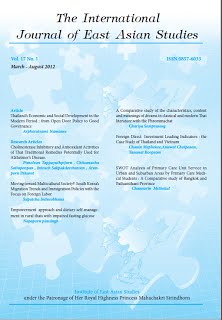Empowerment Approach and Dietary Self-Management in Rural Thais with Impaired Fasting Glucose
คำสำคัญ:
Dietary self-management, Impaired Fasting Glucoseบทคัดย่อ
Background: A two-group-quasi-experimental design was carried out to test whether nutrition education with an empowering approach can motivate dietary self management among rural Thais with impaired fasting glucose.
Methods: Through screening for pre-diabetes in Phetchabun province, 90 subjects were recruited from rural district with 44 in the intervention group and 46 in the control group. The empowerment process consisted of a total of six sessions that covered active learning in nutrition knowledge and skill practice in dietary self-management. Empowerment outcomes and related health indicators were assessed at three interval times in a 1 year follow up.
Results: Critical thinking ability and participatory behavior were enhanced through a supportive environment. Subjects increase their self eff icacy in tailoring a meal plan with proper caloric intake and in the decision of food choice. This resulted in better related health outcomes. The percentage of subjects with fasting blood glucose less than 100 mg/dl was significantly higher in the intervention group compared with the control group, 36.4 [95%CI 22.1-50.6] vs. 10.9 [95% CI 1.9-19.9]. In group of BMI ≥ 23 kg/m2, the percentage of subjects who lost weight ≥ 5 % from baseline value was signif icantly higher in the intervention group, 48.3 [95% CI 30.1- 66.5] vs.10.8 [95% CI 0.8-20.8].
Conclusions: Results from this study suggested that nutrition education with an empowering
approach is possible among rural Thais. Improvement of related health outcomes was shown. There may be a delay in the realization period in the case of some individuals relative to diabetes mellitus. Further study is needed to ensure healthy eating sustainability.



